Photo
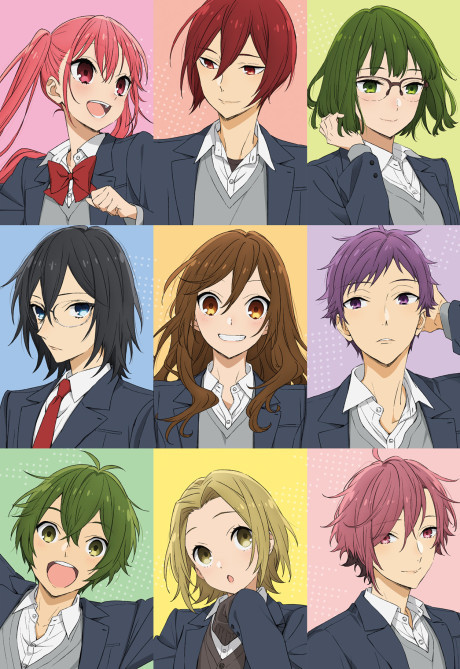
My Thoughts on Horimiya (Anime)
Here are my thoughts on the anime.
I’ll admit firsthand; I’m coming into Horimiya with perhaps, a major bias. That is– I’m a manga reader, and I’ve been reading the manga, month by month, for over half a decade now, so I’ve had a massive amount of time to get attached to these characters and their relationships. So, my view and subsequent thoughts on Horimiya might be tinted with rose-colored glasses, but I’ll try my best to make this review based on the anime and not the manga. (Side note: I don’t actually expect people to read this review, so does basing my thoughts on the anime actually matter? Who knows. In any case, I’ll be writing a separate review for the manga once I’ve reread it.)
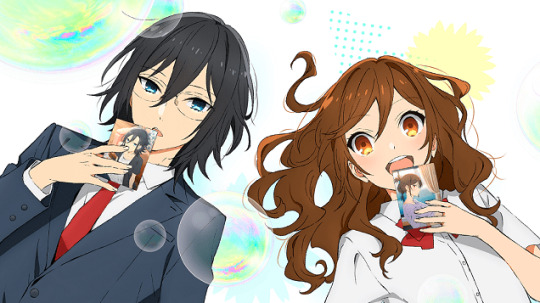
The Goods
Here’s a basic question to be asked: Would I recommend watching Horimiya? The very simple answer is, yes. I would recommend it, purely for the two main characters and their relationship dynamic. What can I say? Horimiya presents a refreshing take on the romance anime genre. Ironically, the refreshing aspect of the show comes from the fact that it’s… well, just straight up realistic (which is what more anime romances need).
In this anime, there are no grandiose displays of love (maybe, except for when Miyamura jumped the fence to buy eggs for Hori). There are no long, dragged out misunderstandings, or complicated love triangles either. There is never a feeling of “Will they/Will they not get together?” And so on. Instead, the anime prides itself on depicting a fairly genuine love story; the main characters discover a “side” of the other that no one else knows, gradually fall in love with each other for relatable reasons, and get into a relationship well before the show is over.
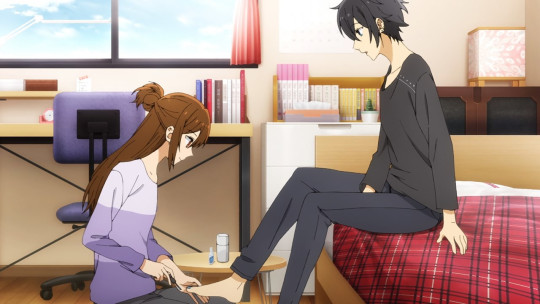
And it doesn’t stop there– Hori and Miyamura still continuously learn new things about the other person even after they start to date, and they fall deeper into love. I think a good amount of people could relate to this; a lot of people have experienced something similar to this in real life, and it’s nice to see it reflected on the big screen. It’s also a good change of pace from the usual romance anime (which often have at least one, if not a combination of the issues listed above). It made me honestly miss my high school days; miss having young love, where having a crush was an exhilarating prospect, and it meant experiencing completely new things. (Not like I can’t still experience new things with my current boyfriend; but my point gets across, right?)
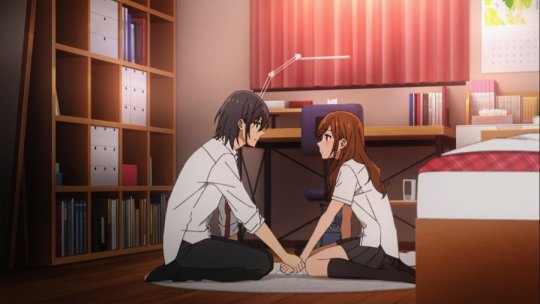
The Bads
That being said, there are a number of flaws this show has. The second half of the series (up until the last two episodes) goes downhill as it starts to focus a lot more on Hori and Miyamura’s friends, aka the side characters. I think this was done deliberately to appease manga readers, however it isn’t that interesting from an anime-watcher standpoint. For example; while Remi and Sengoku are great characters, there really is no need to dedicate half an episode to their backstory when: 1) The anime is already limited on the amount of episodes it airs, and 2) Their story contributes little to the plot.
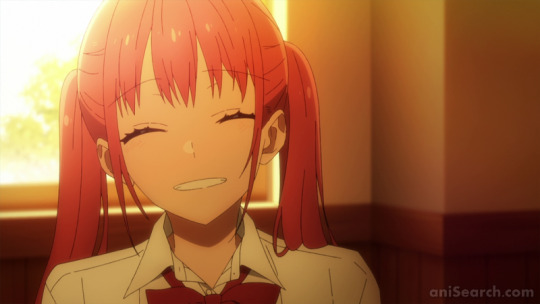
Similarly, the anime puts a large amount of time on the love triangle between Tooru, Yuki, and Sakura, but nothing really comes out of fruition from that (though I admit, this is a manga problem as well.) The show even notes at this itself during a scene where Tooru has lunch with his friends, and he says something along the lines of, “So, Yuki and I are definitely more than friends. But I don’t know if I’m going to do anything about it.” ... And well... true to his word, he doesn’t do anything. They don’t start dating, but he doesn’t reject her either-- in fact, there’s not even so much as a conversation between them about their feelings. Their relationship stays stagnant: as friends, and only as friends, with no indication of romantic feeling whatsoever, despite the multiple episodes that supposedly built them up before. This is the one couple in Horimiya which completely let me down.
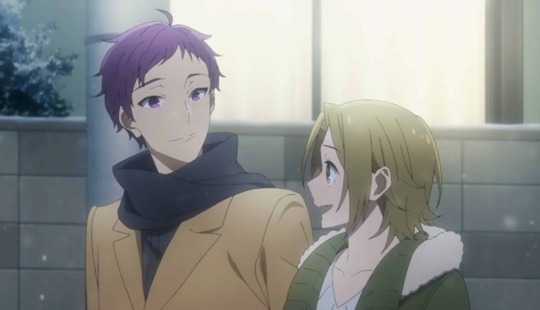
This is not to say the side characters themselves and their personalities are bad in any way-- on the contrary, they’re all lovely characters with gentle personalities and interesting journeys. While the side characters for many anime shows tend to be either straight up boring or annoyingly frustrating, Horimiya’s side cast are at least relatable and personable in a way which most people can understand. But with a 13-episode time restraint, placing so much importance on them ended up diluting both the main story and the side couples’ relationships.
Horimiya’s second major flaw (which is also a manga problem) is the fact that we don’t really get to see the characters’ journeys past their high school relationships. The anime ends with the main characters graduating from high school, but we have absolutely no idea what they’re going to do afterwards. There’s no mention of college or jobs, or aspirations or even daydreams. Similarly, there are personal issues and storylines within each character that could be explored, but are never given the light of day, such as Hori’s self-esteem issues.
Past the Plot
I’m just going to take a moment and say the animation in this show is absolutely beautiful and is one of the things that makes it much more enjoyable. The art rarely falters, if ever at all, and the soundtrack isn’t half bad either. The opening song, Irokousui, is actually kind of a banger.
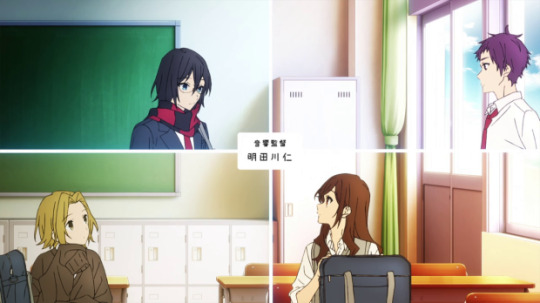
Finally,
Now, I know that I just spent several paragraphs ranting about the obvious flaws of the show. But I promise-- swear on oath-- that overall, Horimiya is a very enjoyable anime. I only have one more thing to say about the show before I go and that is...
At the ending, during Miyamura’s internal monologue... I sobbed. I know it is a happy ending, but I cried and cried, and wouldn’t stop crying for another 30 minutes, and then had a feeling of sadness in my chest for the next 3 days. Even though I read the manga beforehand, I was not prepared at all for the impact of Miyamura’s love letter to Hori-- not prepared for his sweet love, not prepared for the innocence and purity, and most of all, not prepared for the true and final ending to a story and characters I’ve spent years following. To a story and characters I bonded with over the entire course of my own high school career and beyond.
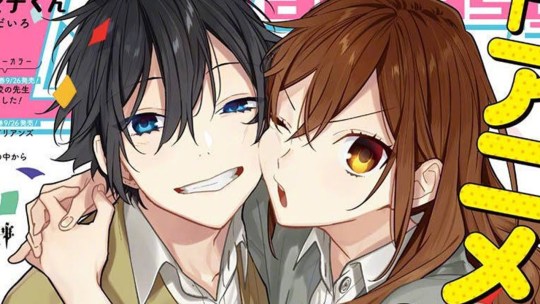
Thank you to the creators of the manga and everyone who poured their heart into soul into its creation. As I said before-- I’m perceiving the anime through rose-colored glasses, but I can’t help but love it.
5 notes
·
View notes
Photo

My Thoughts on Ginny & Georgia: Season 1
These are my thoughts.
Right off the bat, I want to address that this is, by no means, a comprehensive review. I’m not even sure if it can be called a review. These are just my thoughts on the show, and it may or may not cover everything (in fact, it most certainly won’t cover everything), and I’ll try my best to write it out in an organized manner, but I can’t make promises. (Though, in all fairness, this is just a blog for my own entertainment, and I don’t expect anyone to actually read it.)
Now, moving on. Ginny & Georgia, season 1. Where do I begin?
First Impressions
I first encountered Ginny & Georgia on Netflix when the website decided to auto play its trailer while I was scrolling through it. I watched--almost begrudgingly-- a short, 1 minute clip of Ginny complaining to her teacher about how all the books on the curriculum were written by white men. While I understand where Ginny was coming from, and while I understand that a lot of high school literature is written by authors who sometimes are not representative of their audience, Ginny’s introduction just came off as obnoxious and annoying. I thought, “Imagine moving to a new school, and that’s the first thing you say to the teacher.” I rolled my eyes, wrote the show off as another try-hard feminist woke piece (or something like that), and didn’t think I’d watch it.
Well, at some point, I obviously decided to give the show a try. And by the middle of the first episode, I was actually really surprised when Ginny didn’t turn out to be insufferable in the beginning. I say in the beginning-- because her character really slides downhill past a certain point.
Plot
Throughout the entire show, I was probably a thousand times more interested in Georgia’s plot than Ginny’s.
It makes sense-- Ginny’s plot is... well, pretty much a generic teen soap opera that I’ve seen hundreds of times before. There are some unique themes to her story that I’ve rarely seen portrayed in other shows, like her experience as a biracial person, but other than that, it seems to be your run-of-the-mill drama.
On the other hand, Georgia’s plot is fresher. I haven’t personally seen any black-widow narratives (if Georgia could be called that), so I was intrigued and curious by how her story would play out. Not to mention, I liked Georgia’s love interests far better than Ginny’s, but maybe that’s just my personal taste.

In comparing these two plots, I do feel like the writers did Ginny wrong. Georgia is given an interesting storyline with a relevant backstory and plot points that actually make sense, whereas Ginny’s story is mediocre, we rarely get to see her side of the past, and half the stuff that goes down in her life is either unrealistic and overdramatized or it just makes no damn sense.
Characters
I could probably talk a great deal about the characters in this show. I have the most to say about Ginny (75% of it is criticism, honestly), so I’ll dedicate an entire section to her later. For now, I’ll start with these characters:
Georgia: Georgia, oh Georgia. To put it simply, Georgia is a psychopath hidden behind a large smile and a buzzing Southern accent. For the first 5 episodes, I was so fooled by her act (and her beauty) that I forgot she’s a literal murderer and most likely not a good human being. But I guess that’s, in part, what makes her very interesting to watch.
Hunter: I literally felt nothing but a mixture of boredom and pity whenever Hunter was on screen. For the first 8 episodes, he is just an extraordinarily boring character-- and his boringness is used as a justification by Ginny to cheat on him (that’s where the pity part comes in). I enjoyed how how he got more character in the ending episodes, and I could understand his struggles when he fought with Ginny (in that scene). But if he wasn’t dating Ginny, then he would’ve been a completely forgettable character.

Marcus: Marcus ALWAYS looks like he’s high. I don’t think there’s a single scene in the show where he doesn’t look like he just smoked something. He also has little personality, other than being the “bad boy.” I guess his hotness makes up for it, or something?
Maxine: While I enjoy Max overall, I think she can be really annoying, talkative and insensitive at times. Emphasis on the last part, because she does this irritating thing where she says something racist, and then asks if she just said something racist.
Abby: Out of the friend group, I feel like Abby is the most dramatic without being overdramatic. She experiences things that a regular teenager would. However, she can be a bad friend at times, and I don’t like how the characters gives her a pass on some questionable choices she makes.
Paul: I like Paul. It is a little bit hypocritical of me to say Paul is a good character when he basically has the same exact personality as Hunter, but I’m going to say it: He’s a good character.
Zion: Zion is smooth, and I enjoy his little wisdom bits with Ginny. But he was introduced too late into the show, and I can’t see him being a good fit for Georgia.
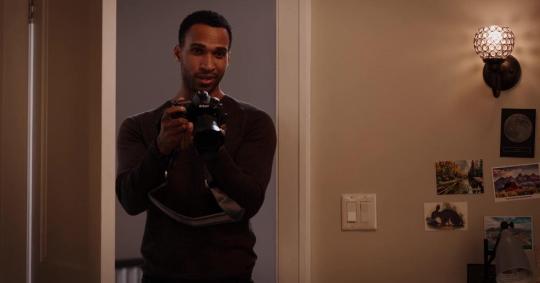
Joe: I love Joe. Just like some of the other characters, he is kind of plain. Kind of vanilla, daresay boring, but for some reason, I love him. Maybe it’s because of his adorable connection with Georgia. Maybe it’s because he offers some much-needed comedic relief in this overdramatized show. Maybe it’s because he has attractive qualities, like running a “successful” business, or maybe he’s just my type. For many, many episodes, I wanted Georgia to get together with Joe the most.
Austin: I forgot Austin existed for half the time. Like, I know the kid stabbed someone, but in the grand scheme of things, he’s just so forgettable.
Character: Ginny
Ginny. Ah, where do I even begin with Ginny?
First, I’m just going to say this: I know the writers intended to depict a biracial person’s experience in America through Ginny. I’m not biracial myself, and I don’t fully understand the issues that biracial people go through, so I’m not going to comment too much on how the authors managed to fuck up. I say “how” and not “if,” because a lot of biracial people have said that Ginny & Georgia is kind of a bad example of their life, and also because even I can see the problems with the show from a mile away.
Getting that out of the way, I’ll start with Ginny’s overall character.
One would think that a character who is depicted as-- for a lack of better words-- as “woke,”... as in, a character who is supposed to have better moral values than others (the definition comes from the word’s general connotative interpretation from leftist media), would be a good human being. But time and time again, we see that Ginny is everything but.

These are my biggest issues with Ginny’s character:
1) She acts like she’s better than everyone else, but also like she’s super oppressed. I know these two personality traits aren’t mutually exclusive, but they’re not a good combination either.
2) She thinks she’s the only person in the entire town who has real issues. Other characters confront her about this, and she eventually mellows down, but it’s astounding to me the amount of people she had to offend before she got the point.
3) She can be really ungrateful and rude towards her mom. I know Georgia is not a perfect mother-- not even close-- and she can be genuinely crazy at times, but Ginny is very rarely appreciative of her mom’s efforts.
4) Despite Ginny’s intelligence, she is not smart. She commits a bunch of dumb mistakes. Now, some of these can be attributed to her just being a teenager-- like having unprotected sex, sending nudes, being peer pressured into stealing, etc. Whereas other choices-- most notably cheating on her boyfriend-- are just a product of her shitty personality.
5) There is a really bad implication concerning Ginny’s views on race. I can probably talk a lot about race in this show, but true to my word, I’ll keep this short and talk about the one thing that really bothered me: Ginny ignores the black kids. There’s a line in the show where Ginny says she’s too white for the black folks and too black for the white folks... and she uses this to justify never having any friends or not fitting in. But when she gets to Wellsbury, she’s accepted by everyone, including black people, yet she chooses to ignore them. She only sits with them near the end of the show when her friend group kicks her out. And she looks miserable.
Ginny likes to complain a lot about her white side, but all things considered, I think she has an issue with her black side instead. I don’t know if this is representative of the biracial experience, but I imagine this can’t be a good thing to portray on screen.
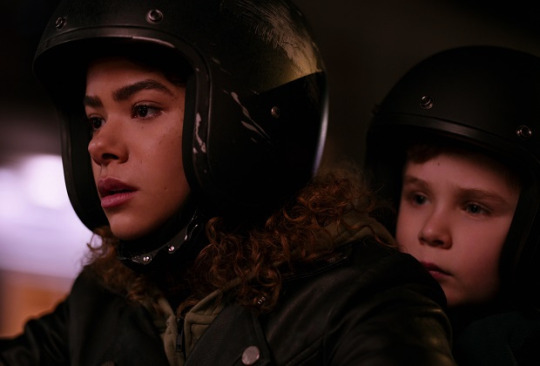
I know it’s crazy of me to say this right after I just ripped Ginny apart. However, despite everything, I actually like Ginny as a character. Do I like her as much as I like Georgia or Joe? No, but she swings more good than bad. What can I say? She’s entertaining (in the same way that Cheryl from Riverdale is entertaining). She’s at least somewhat relatable, and I wouldn’t have watched the entire season if I truly found her to be unbearable.
That being said, Ginny does have a lot of potential to grow, and I sincerely hope the writers do her better in the next season.
Themes
*At some point in the future, I may add more to this section.
Family: Despite a significant portion of this show being terribly unrealistic, I appreciate the show’s overall depiction of family and separation. For one, the show represents families who aren’t stereotypically nuclear. Our main protagonists are a single mother-daughter combo. The Bakers next door have a deaf father and a mother who doesn’t fit into a perfect mold. There’s a biracial family (Hunter) who connects far more with their American side than their Taiwanese-- so much that Hunter and his sister don’t even speak a lick of Mandarin. The small details and nuances which are added into the show makes them far more representative of the general American population.
Conversations: This show gives conversations that are far overdue in media. While Hunter and Ginny’s fight scene is 98% pure cringe, the remaining 2% of it is an important reminder on being biracial (or a person of color) in America. Many of us struggle with our racial identity, and it’s unproductive to compare who has it worse.

Overall + Rating
To me, the first season of Ginny & Georgia is a 6.5/10. (Five being the average; so this would be a little better than average). While it showed a lot of potential at the beginning, the show eventually devolved to nothing more than a standard melodrama-- even on Georgia’s part. It tried hard to be another Gilmore Girls but ended up falling quite short. I am looking forward to its second season though; and hopefully, it’s much better than the first.
11 notes
·
View notes